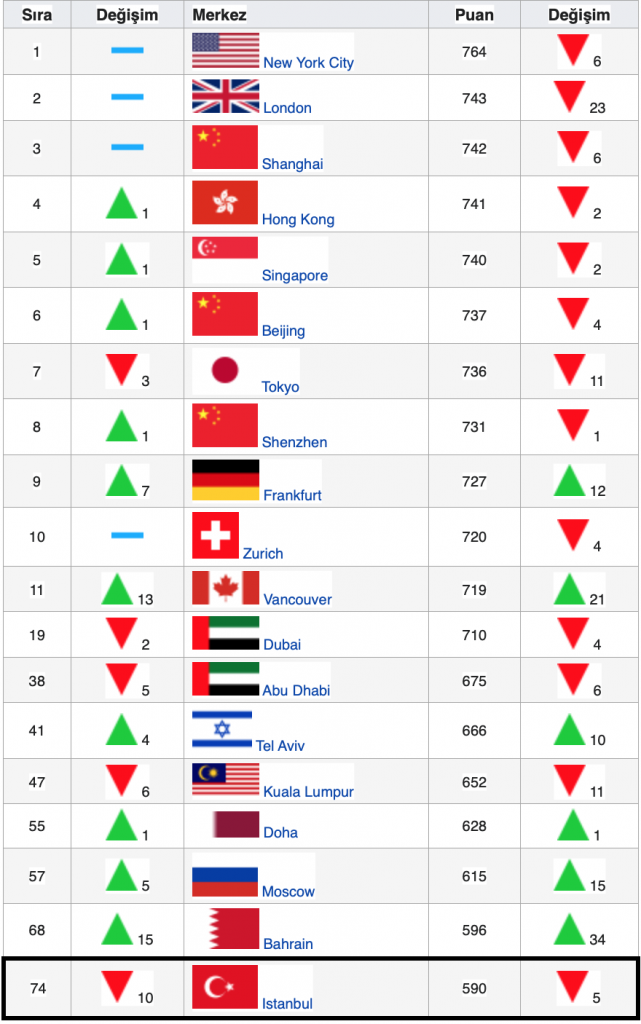What is a Financial Center (FC)?
A Financial Center is the term used to describe clusters where participants of banking, asset management, insurance, and financial markets carry out their activities, supported by legal and physical infrastructure.
Financial Centers typically include financial intermediaries (banks, agencies, and brokerage firms), institutional investors (fund managers, pension funds, insurance companies, hedge and venture capital funds), companies and governments that issue financial instruments, and exchanges and brokerage firms subject to independent regulation and clearinghouses. Financial Centers also host mergers and acquisitions, initial public offerings (IPOs), and corporations that provide institutional services. Additionally, Financial Centers include institutions that support all financial activities that take place within them, such as appraisal and rating agencies, legal and accounting consultancies, tax consultancies and structuring, and corporate formation services.
According to the IMF classification, the largest International Financial Centers (IFC) are recognized as New York, London, and Tokyo. IFCs have deep and liquid markets that support both the variety of sources and uses of funds, as well as local and global economies. The presence and effectiveness of regulatory and legal institutions that regulate the relationship and disputes between participants is a prominent feature of IFCs.
Examples of Regional Financial Centers (RFC) include Shanghai, Shenzhen, Frankfurt, and Sydney. These centers are smaller and regional in scale compared to IFCs and play a significant role in the entry and exit of foreign investors to their respective regions.
Offshore Financial Centers (OFCs) are centers that specialize and focus on certain financial services and serve economies on a much smaller scale. A significant characteristic of these centers is the relative lightness of regulatory and supervisory institutions. The most important OFCs include Ireland, the Caribbean, Hong Kong, Singapore, and Luxembourg.
What are the conditions required to become a Financial Center?
- Strategic location, proximity to trade and capital markets,
- Presence of capital markets, stock exchanges, independent regulatory bodies and boards where globally recognized financial institutions (private and public banks, insurance companies, brokerage firms, asset management companies…) and depth of regional/global companies are traded,
- High-level, effective and rapid communication, logistics and trade infrastructure,
- Independent courts that follow transparent, reliable, predictable laws that are supported by political authorities, detached from daily politics, and make independent decisions,
- Predictable, understandable, simple tax legislation and competitive tax rates,
- Well-educated and high-quality human resources that can sustain the centers,
- A safe, democratic, and open society with a low crime rate, education opportunities and a high standard of living for foreign employees and their families, guaranteed by universally accepted laws that respect lifestyles.
As of March 2021, the ranking of world financial centers scored according to the above criteria is as follows. Cities that have long been ranked at the top and considered unbeatable are facing serious competition from emerging new financial centers. The main ones among these are the Toronto, Seoul, Boston, Geneva, San Francisco, Sydney, Luxembourg, and Dubai Financial Centers.
Istanbul, located at the intersection of the world’s oldest trade routes and with a strategic geographical location, is only ranked 74th in the ranking, as seen. It is even lower than economies that are much smaller than itself.

The Istanbul Finance Center (İFM) project was planned in Atasehir Istanbul on an area of approximately 2.7 million square meters in 2009 and is planned to be completed in 2022. The aim is to move the Central Bank of Turkey, state-owned banks, and other financial institutions to this center. As it stands, the IFC is nothing more than a commercial construction and development project. The move of the Central Bank from Ankara to Istanbul is not much different from the relocation of Ataturk Airport, which is currently in service, to the newly built airport at a cost of billions of dollars. Moving public banks and financial institutions, including the Central Bank, to a newly assigned building will not make Istanbul a financial center.
In 2021, Istanbul dropped 10 places from the previous year to 74th place in the ranking of world financial centers. Despite being a historical commercial center with its strategic location and trained workforce, Istanbul is far from meeting the necessary requirements to become a financial center compared to other major cities in the region.
- Infrastructure: Speed and efficiency in transactions are indispensable priorities for financial centers. Turkey’s current internet connection speed ranks 103rd among 175 countries worldwide. In the financial world where even milliseconds matter, it is impossible to be a regional financial center with this connection speed.
- Independent Institutions: Shortcomings in the independence and transparent decision-making mechanisms of financial regulatory and supervisory institutions, including the Central Bank in Turkey, create uncertainty about predictability and stability for financial players. Since institutions that are managed by personnel who are under the influence of politics and lack competence cannot be independent, it cannot be expected for investors to take an interest.
- Lifestyle and Universal Values: It is necessary to provide a high standard of living, socio-economic and socio-cultural superiority, and good educational opportunities to people and families from different nations and countries who will work in financial centers. In this context, human rights violations, illegal practices, interference in lifestyle, and overall pressure against freedom of thought, which have recently become prevalent in Turkey, make it difficult to employ a quality workforce that thinks freely and adheres to universal values.
- Tax System: The current tax system in Turkey is primarily composed of indirect taxes, is complex, and has considerably higher amounts than rival countries in the region in terms of proportional rates. A country that claims to be a financial center must provide attractive benefits, primarily in taxes, to new incoming investors. The predictability and transparency of tax authority examinations and penalties that are out of sync with political interests are also one of the most significant concerns for investors.
- Macroeconomic Situation: Turkey’s risk premium (CDS) is traded at 370 basis points. This rate is quite high and is immediately after the world’s riskiest countries such as Venezuela and Argentina. The high CDS premium is due to structural current account deficit, budget deficit, inadequate Central Bank reserves, high foreign debt, long-term obligations in foreign currency resulting from public-private partnerships outside the balance sheet, and high volatility of the Turkish Lira against other currencies. Turkey’s credit rating given by credit rating agencies is well below the investable level, even in the speculative and high-risk categories. In the current economic situation, it is impossible for a country to be evaluated as a financial center.
Based on the main headings mentioned above, trying to become a financial center by building tall buildings and carrying the politically controlled public banks that are currently inefficient is a great illusion. To become a financial center, structural reforms need to be made in all areas of life, first by creating infrastructure and attraction centers to gain the trust of domestic and foreign investors. Many of the structural reforms that need to be implemented to become a financial center are not even related to financial issues. The rule of law and the independence of the courts, the guarantee and implementation of freedoms by the constitution, and the provision of political ethics and transparency are among the reforms that need to be implemented.

